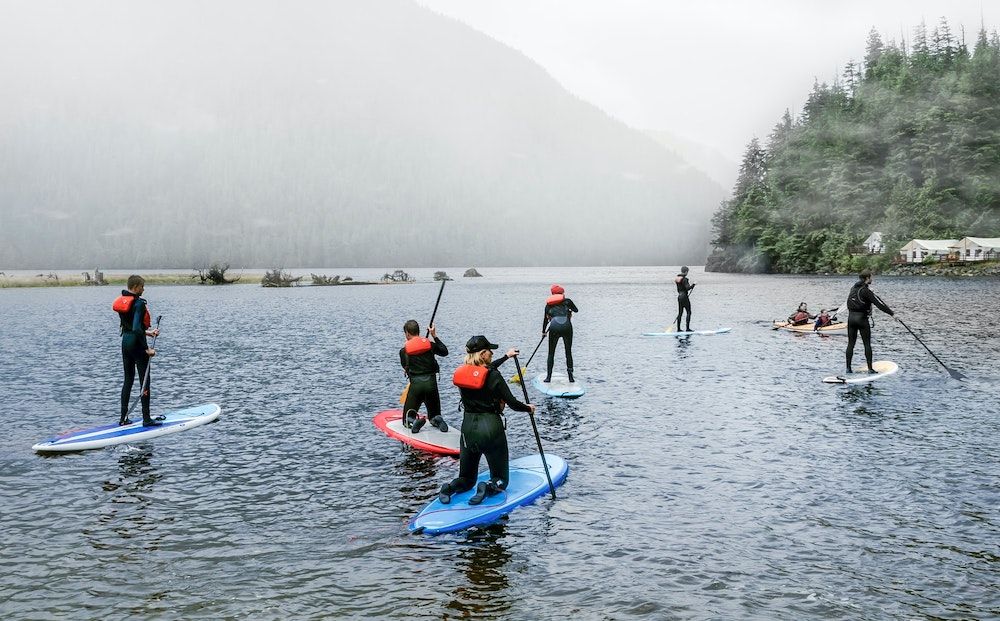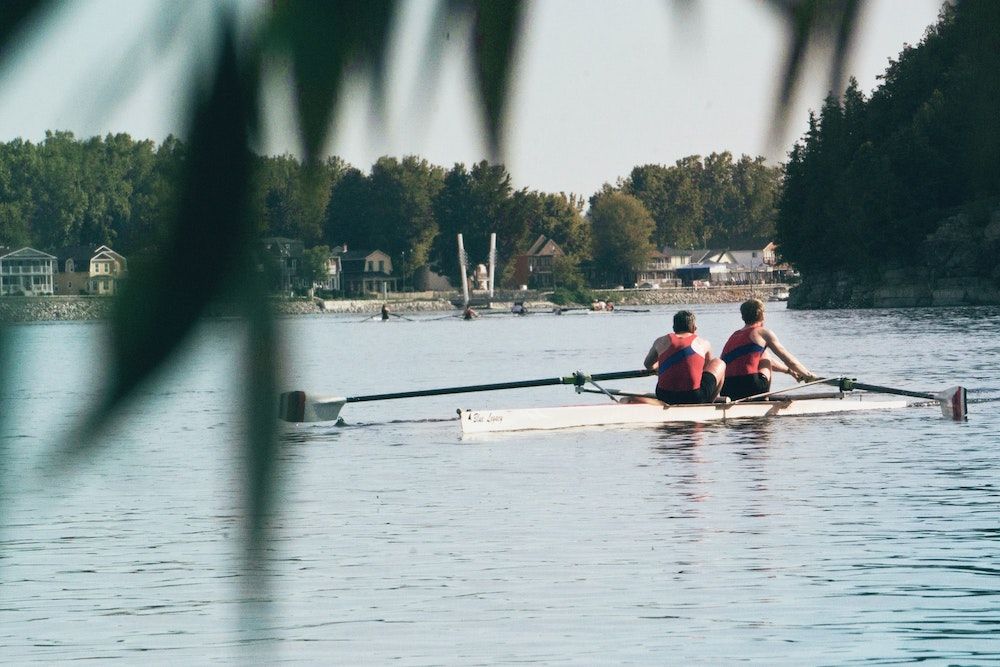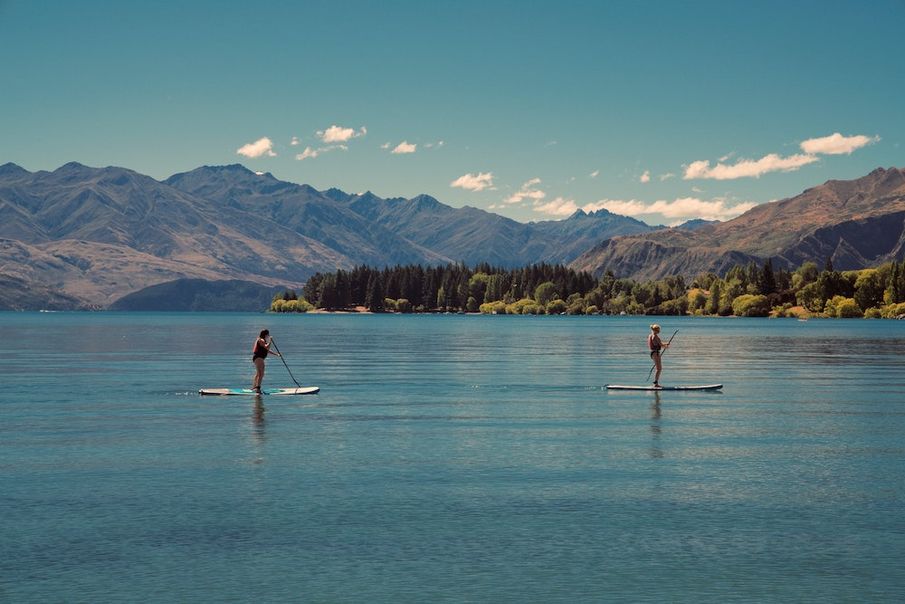Experiencing early menopause was unexpected and difficult for Happiful’s Lucy Donoughue, but getting out on the water and embracing joyful movement helped her to address a challenging relationship with her body
I can distinctly remember the first time I experienced the wonder of water. I was eight years old, sitting on the beach at Treyarnon Bay in Cornwall, totally mesmerised by the sea. I watched the waves and how the reflection of the sun caused the water to sparkle, for hours on end.
Rivers, lakes, and open stretches of water had the same joy-inducing and restorative effect on me, and I wanted to be near, on, or in the water as much as possible. Sadly, as I hit puberty and became more conscious of my body and what I thought I needed to look like to wear a swimsuit, I stopped wanting to immerse myself and stayed firmly on dry land.
Just as becoming a self-conscious teenager forced me to retreat from the water, entering early menopause emboldened me to embrace the waterways once again. Not because I love how I look now – far from it. Over the past three years my body has changed significantly; I experience joint ache on a regular basis, my limbs aren’t as flexible as they once were, and body acceptance eludes me every time I look in the mirror, although I work on it daily.
I’ve spent so many summers over the years telling myself that when I’m finally happy with how I look and feel, I’ll sign up for paddleboarding, wild swimming, or another activity that will get me out on the water again. However, when my menopause arrived earlier than anticipated, it felt like a definite and unexpected change of course in my life, and I decided that if I kept waiting until I felt completely comfortable in my own skin, I’d miss out on a million things that I know will bring me deep joy right now.

I eventually took the plunge, and signed up to learn to paddle board earlier this year. The thought of starting a new activity brought back a feeling of excitement I remember experiencing as a child, before self-doubt and poor body image crept in.
I’d love to share that I took to stand up paddleboarding (SUP) like a duck to water. The truth is that in my first lesson I collided with a tree overhanging the riverbank, and went home with twigs in my hair. In the second lesson I fell in the Thames while simply getting on my board, and in the third I face-planted while trying to stand. In the fourth, I almost stood up, but thanks to hip and back pain and a current lack of flexibility, I didn’t quite make it.
That’s not the whole picture though. I also witnessed geese flying overhead in a magnificent formation as I paddled (albeit on my knees) down the river with the sun on my face. I learned that it feels good to stretch and treat my body with kindness instead of berating myself when I can’t move in the way I used to, and I’ve laughed loudly and often during lessons, and felt exhilarated when they’ve come to an end, knowing that I’ve progressed just that little bit since my last session on the water.
Rachel Bambrough, founder of SUP4, has quite literally been by my side throughout. She’s witnessed many people’s journey on the water, and believes that it’s the experience, joy of movement, and personal growth, that’s important. It’s not our collective learned behaviour of reaching an end goal or ‘succeeding’, that so many of us might have in mind when we first start a new activity or form of exercise, just to validate the time we spend doing it.

“Too many people focus on ability and being able to ‘get it right’, but there’s no one way to be or learn,” Rachel explains as we paddle. “It’s about your personal experience, and it's OK if you take your time. Most importantly, it’s OK to fall in! Falling isn’t failing, you learn from it.”
Being on and in the water, Rachel says, truly allows you to be present. “The focus on balance, buoyancy, being completely surrounded by nature, and away from screens and technology, ensures you’re living 100% in the moment, which is a beautiful and often rare experience in our noisy, busy world.”
The other benefit, we both agree, is a more respectful and self-compassionate relationship with our bodies. Since getting out on the water again, I’m more aware of what my body feels like from day to day, what it can and can’t do, and how I’m getting stronger and more flexible with every session. I’m now interested in how certain stretches can help my mobility, rather than how they might tone my stomach, thighs, and bum.
"If I keep waiting until I feel completely comfortable in my own skin, I’d miss out on a million things that I know will bring me deep joy right now"
Starting SUP has been the catalyst for spending even more time in the water, and in swimsuits, wet suits, and deeply unappealing swimming caps. I’ve started wild water swimming (cold water has the effect of drastically reducing joint pain for some hours after), and I’ve attempted SUP yoga, which was a beautiful, if not wobbly, experience. I also continue to paddleboard regularly with Rachel, and it’s the absolute highlight of my week.
Getting back out in the water has been pretty pivotal in challenging the way I feel about myself at this unexpected, and sometimes difficult, stage in my life. I’ve amazed myself by posting pictures of SUP fails on social media – because they make me smile each time I see them, and remind me of a wonderful experience full of joy – when in the past I would have deleted them because of the way I think I look, and the fear of the judgement others might make. And that in itself is a huge step forward, and a very welcome change. I’ve finally found my flow.
To connect with a life coach to discuss building confidence, visit lifecoach-directory.org.uk


Comments